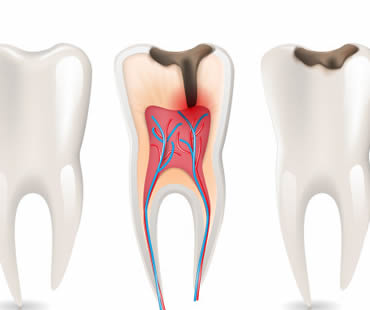
One thing that can make an entire family smile is good oral health. When everyone has healthy teeth and gums, there is more reason to show off those great smiles. Oral health issues can even run in families, so taking care of a problem in one person may help other family members as well by alerting them to the condition. Family dentists can benefit everyone in your household. This type of dentist treats all family members, no matter what their age is. Young children, teens, adults, and seniors are all treated in one dental practice. Family dentistry focuses on taking care of the oral health needs for everyone in the family, and offers a variety of benefits by doing so.
Establishing a healthcare relationship with a family dentist means that everyone goes to the same office for appointments. The dentist and staff get to know each person, and can provide a level of comfort knowing that everyone is receiving the same standard of care. Family dentists understand your needs and those of other family members too.
Family dentists are trained and experienced in providing care for all kinds of issues. This always includes routine dental care like cleanings, fluoride treatments, sealants, and fillings. Some family dentists also perform procedures like implants, veneers, bonding, contouring, root canal treatments, and even orthodontics. You should choose a family dentist who offers services that meet the needs of every family member.
Another thing that family dentists are skilled in is teaching patients the best ways to care for their own oral health. Children may need to be taught how to properly brush and floss, teenagers might need reminders about consistent care or maintenance with braces, and adults often require special attention for good gum health. Seniors face unique challenges related to maintaining their oral health in order to keep their natural teeth. Family dentists understand the needs of patients at each stage of life, and can provide optimum treatment for those specific challenges.
Your smile is one of your most valuable assets and your oral health should not be compromised. Finding a good family dentist is your first step in the right direction.
Take the first step towards optimal oral hygiene. Reserve your dental appointment at our Longview dental office now and experience personalized care.

There are many misconceptions about root canal treatment. This process is recommended when your tooth pulp is infected or damaged, and the treatment is needed to save your tooth. The damaged pulp is removed from your tooth and filled with a material that prevents future infections. A crown is often recommended to be placed over the tooth to complete the procedure and preserve the tooth. If your dentist recommends this treatment for you, it may save you some worry if you know the truth about the procedure.
Truth about the pain
Root canal treatment has advanced over the years, making it much less painful than its previous reputation. Anesthesia is used during the procedure, and most patients say it is no worse than getting a filling.
Truth about office visits
The procedure can usually be completed in just one or two office visits. Several factors impact the number of appointments, such as the extent of infection, complexity of the procedure, and need for referral to a different health care professional. Your dentist will be able to advise how many office visits are needed for your treatment.
Truth about symptoms
Your tooth does not absolutely have to be painful to indicate the need for a root canal. A dentist may diagnose a serious problem even when you don’t feel discomfort. That’s one reason regular checkups are important, so that issues can be caught.
Truth about cause
It is a myth that root canal treatment is caused by illnesses like heart disease, arthritis, or kidney disease. Medical research has proven these long-time myths to be untrue.
Truth about success
The benefits of root canal treatment can last a long time, even permanently. Sometimes patients experience broken teeth after treatment, but dentists attribute this to failure in the restoration or tooth construction instead of the root canal treatment itself. Patients who do not opt to get crowns tend to experience tooth breakage more often.
Take the first step towards a confident smile. Contact our Longview dental office to schedule your consultation!

It seems that with each passing year, our lives become more hectic, scheduled, and harried. If you have children, there are the endless school events and music lessons and sports practices. Running from here to there can leave you less time for some of the most important things, like your oral hygiene.
Have you found yourself putting off your regular dental check-up? Has it been more than a year since you saw your dentist? Are your children up-to-date with their dental visits, but you’re falling behind? This can happen, especially as we place the care of others over the care of ourselves.
By choosing a family dentistry practice, this can be a thing of the past when it comes to your teeth! A family dentist can see each member of your family, from the youngest infant to the oldest retiree. All of your dental visits occur in the same office, so you won’t be jumping in the car to go yet somewhere else, stuck in traffic and feeling overwhelmed.
With family dentistry, you can schedule your appointments to have multiple family members seen back-to-back or at the same time. This is especially of interest to families with multiple children. Imagine having three or four appointments going on at the same time, and being done after the time of a single visit! Reduce the time you spend in the waiting room with squirming or unhappy children by choosing a family dentistry practice.
Your family dentist realizes that your time is extremely important, and that each member of your family is important and valued. A family dentist knows about all of the changes your teeth undergo over time, and is sensitive to this. It’s easy to make smile goals with your family dentist, as he or she will be there from the start to the finish.
Make the choice to simplify your life. Make it easy to keep you and your entire family smiling brightly. Choose a family dentistry practice today.
Do not wait any longer. Book your appointment now and achieve the smile you have always wanted. Dr. DiStefano is accepting new patients from Longview and the surrounding area.

Root canal therapy treats the interior of the tooth. The final step in root canal treatment is placing a permanent restoration to protect the tooth and restore it to full form and function. This procedure should be performed within one month of your root canal treatment to decrease the risk of re-contamination or breakage of the treated tooth. Having a permanent dental restoration placed will extend the success of root canal treatment by preventing damaging leakage or fracture.
The general condition of the treated tooth and the amount of tooth structure lost will determine if the tooth would be best restored with a permanent composite filling or a dental crown. For small cavities in front teeth with insignificant tooth structure loss, your dental professional may place a tooth-colored filling after a root canal procedure.
More often, your dentist will recommend the placement of a dental crown to restore a root canal treated tooth. Teeth that have had root canal therapy can be fragile, and a dental crown provides the best protection against future bacterial contamination and fracture. A dental crown is made in a laboratory and custom fit your tooth. Crowns are made of porcelain, metal, or a combination of the two. Dental crowns can be placed on front or back teeth, and are especially appropriate for molars that must withstand heavy chewing forces.
Having a root canal treated tooth restored with a dental crown or permanent filling will extend the success of your treatment. If you are showing symptoms of a damaged or diseased tooth, a properly performed root canal treatment and permanent restoration can save your tooth and extend its function for a lifetime.
Take the first step towards a confident smile. Contact our Longview dental office to schedule your consultation!

Do you have a single tooth that has darkened due to trauma? The first step in determining if a damaged tooth can be lightened is to visit your dentist for a thorough examination.
Your dentist will need to identify what is causing the dark staining. To do this, your dentist may perform x-rays or other tests to learn if the pulp of the tooth is “vital” or alive. If the tooth is deemed to be alive, external bleaching may yield the whitening results you are seeking. Your dentist can create a single-tooth bleaching tray to whiten the traumatized tooth effectively. This type of tray keeps the bleach away from other teeth, producing the best color match for your overall smile.
However, if it is determined that the nerves have died and it is no longer a living tooth, your dentist may need to perform a root canal. Darkening of a dead tooth can happen immediately or may develop over time after a root canal procedure has been performed. For this type of tooth trauma, your dentist or endodontist may recommend bleaching the tooth from the inside.
Stains from a non-vital tooth come from the inside, rather than outside, of the tooth. Therefore, your dentist needs to put the bleach inside the tooth. This type of teeth whitening is a routine procedure that involves making a small opening in the tooth through which to bleach the tooth. Once this procedure is complete, you can assess with your dentist whether the desired results have been achieved. If the whitening is not enough, the tooth can then be bleached externally as well. If the results are still not acceptable, you may want to consider a tooth-colored veneer or crown.
If you have a darkened tooth marring your smile, consult your dentist to determine the best teeth whitening treatment to return your smile to its bright, white best.
Take the first step towards optimal oral hygiene. Reserve your dental appointment at our Longview dental office now and experience personalized care.

Root canal treatment is often a last resort for people who are experiencing tooth pain and want to save their damaged tooth. Although the procedure isn’t nearly as scary or painful as in years past, most patients view the aspect of this treatment with disdain. Recovery from a root canal is often no worse than recovering from a dental filling, but there are some issues that affect your ability to recover from root canal treatment.
Tooth condition
The severity of your tooth’s condition plays a big role in your treatment. If your infection or decay is not too advanced, it may mean an easier recovery than a patient with acute problems requiring extensive root canal treatment. Your dentist will determine the severity of your case and be able to prepare you for what to expect.
Dentist qualifications
Although all dentists are trained to perform root canal treatment, not all of them choose to offer this service as part of their practice. Your dentist may refer you to an endodontist, who is a dentist specializing in root canal treatment. These types of dentists are trained in all aspects of root canals and can handle even the most severe cases. Often, endodontists are so experienced and knowledgeable that they can even help shorten your recovery period after treatment.
After care
No matter which dentist performs your treatment, you should receive detailed instructions about how to care for yourself afterwards. You will be given guidelines about what to eat and what to avoid, how to handle pain, activity restrictions, and other details. There may also be mouth exercises suggested to follow to aid in your recovery. Make sure you keep any follow-up appointments to ensure proper healing.
Do not let another day go by without taking care of your dental needs. Request an appointment now at our Longview dental office!









